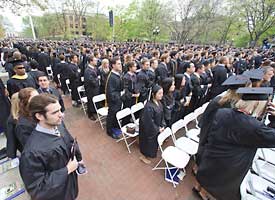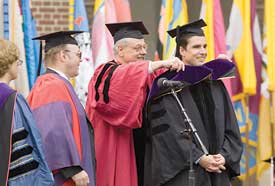ABC News anchor and special correspondent Bob Woodruff, who was seriously injured while reporting from Iraq, drew upon his professional and personal experiences as he offered messages of hope to the graduating class of 2008.
“You have the power and the influence to affect change,” said Woodruff, who received an honorary Doctor of Laws degree at the Spring Commencement. “You may not feel it right at this moment, but the future is you.”
Surrounded by a canopy of budding trees, about 30,000 people — including 5,000 graduates — gathered April 26 in the Diag, which took center stage as Spring Commncement venue for the first time in the University’s 191-year history.
“Like the trees that surround us, your academic roots are here, bound tightly in an unparalleled experience,” President Mary Sue Coleman said of the historic venue.
 |
|---|
 |
 |
| Bob Woodruff, right, receives his honorary Doctor of Laws degree. |
“The true promise of our University sits before me, draped in caps and gowns and eager to celebrate the tremendous accomplishment of a Michigan diploma. Graduates of the University of Michigan have walked on the moon, won Pulitzer Prizes, graced the stages of Broadway and occupied the Oval Office. I am confident that you, the Class of 2008, will continue to break barriers and make headlines, drawing on the knowledge, creativity and insight you have gained here from your faculty and your classmates.”
The University brought in 30,000 folding chairs and 20 bleachers to accommodate the commencement crowd. Concerns about ongoing construction at Michigan Stadium prompted officials earlier this year to move the ceremony from its traditional venue to Central Campus. In the weeks before the event, workers transformed the iconic Diag into a graduation setting, trimming trees, laying down plastic flooring, and setting up a stage and seating for the ceremony.
Environmental studies major Brandi Thompson of Columbus, Ohio, described graduation day as “bittersweet.”
“It’s cool to be here in the Diag; it’s where we started, it’s the core part of the University,” said Thompson, who wore a green recycling symbol atop her cap so her mother could see her in the crowd.
Brian MacFarlane of Howell, who received a bachelor’s degree in electrical engineering, said he was pleased with the new commencement location.
“It’s nicer out here, prettier than a football field,” he said.
Graduate exercises took place April 25 for all master’s and doctoral graduates and candidates who receive their degrees through the Horace H. Rackham School of Graduate Studies. Frances E. Allen, who earned a master’s degree in mathematics at U-M and designed programming language to help crack Cold War-era codes, delivered the commencement address in Hill Auditorium and received an honorary Doctor of Science degree.
The Class of 2008 comprises approximately 7,500 eligible undergraduate and graduate students.
Woodruff, who was raised in Birmingham and earned his Juris Doctor from the U-M Law School in 1987, reminded the class to think of service men and women — many of whom are college-age — who daily risk their lives in combat.
“You will inherit this next generation of wounded and it will be up to you to help them as they assimilate back into society, and the express gratitude as a society for the fact they raised their hands to go to Iraq and Afghanistan so you would not have to.”
After covering major stories such as the Sept. 11, 2001, terrorist attacks, Hurricane Katrina and the South Asian tsunami, Woodruff was named co-anchor of ABC News in January 2006, and 21 days later sustained a nearly fatal brain injury while reporting on the U.S. military in Iraq.
In his return to broadcast journalism in February 2007, 13 months after being injured, Woodruff used his experience to tell the story of others who have returned from war with similar injuries.
“You should never underestimate the power of the human spirit,” said Woodruff, who spent 36 days in a coma after his injury. “Human beings are incredibly resilient. The body and the mind can do amazing things. People can fight back against great odds and triumph. And when you hit that rough patch in your life, you will need to draw upon all of your artillery.”
Woodruff encouraged graduates to be fearless in their pursuits, and shared the story of how he became a journalist. In 1989 he was teaching law in Beijing and providing translation services to CBS News during the turmoil at Tiananmen Square. He eventually accepted a job with a San Francisco law firm that, despite a six-figure salary, left him unfulfilled. With a wife an infant to support, he took a great risk to quit that job and become a TV reporter making $12,000 a year.
For the next 15 years, he worked his way up the ranks of television news reporting and in 2006 was named the replacement for the late ABC news anchor Peter Jennings.
“Don’t fear change. Embrace it,” he said. “Give yourself the freedom to switch careers, go back to school or choose your passion when it comes to designing your life. Dream big. And most importantly, don’t be afraid to fail.”

